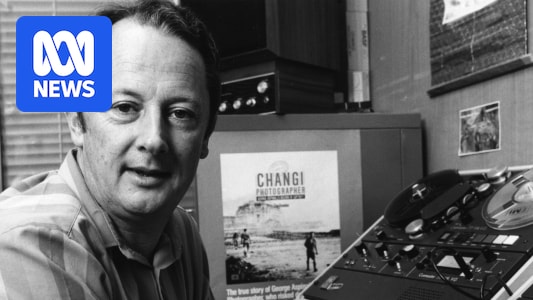Former ABC journalist Tim Bowden – who died on Sunday, aged 87 — discovered journalism as a teenager, sneaking into the back row of the theatre in 1950s Hobart to watch Cinesound newsreels, before television was common in Australian homes.
“Before television, it was still possible to get your visual current affairs fix. These newsreels were very popular,” Bowden told the Film and Sound archive in 2005.
“Some of us used to sit there a bit longer than we should because [spending time with your girlfriend] in those days was very difficult with any sort of privacy,” he joked.
From that unlikely beginning, Bowden also fell in love with journalism.
“Tim was part of the fabric of the ABC for decades and made a huge contribution to the national public broadcaster and to the nation,” ABC managing director David Anderson said.
“He was generous to his colleagues and was known as much for his sense of humour as his passion for journalism and the ABC.”
Journalist and cinematographer David Brill, who was writing a book with Bowden before his death, said the broadcaster had always maintained his sense of humour.
“He always told me when we used to talk about journalism to keep the English language simple and have a sense of humour,” he told ABC Hobart.
Tim Bowden spent his career at the ABC.
From Hobart to the world
Bowden grew up in Tasmania and after graduating from the University of Tasmania in 1960 with a Bachelor of Arts degree he headed for the UK where he worked as a producer and radio interviewer with the BBC’s Pacific Service.
Three years later he was back in Tasmania and joined the ABC where he stayed for the remainder of his long career in journalism.
“Journalists are generally rated in the public mind on the same level as used car salesmen, lawyers, politicians or other professionals of dubious reputation,” Bowden has written.
“But I’ve always been a happy traveller in journalism which … gets you into all kinds of situations that you otherwise would have had a snowflakes chance in hell of experiencing.”
For Bowden, journalism led him to a posting as a foreign correspondent with the ABC in Singapore in the mid-60s where he covered conflict between Malaysia and Indonesia, before working as a war correspondent in Vietnam.
Tim Bowden with American Marine corporal Jim Keith, Vietnam, near Da Nang, July 1966.
“No army was ever going to give the press the freedom that they’d had in the Vietnam war” Bowden said in the wake of Vietnam.
“You can be embedded but, of course, you’re totally the creature of the army and the unit you’re with and you have to report what they’re doing in a positive manner — otherwise they won’t let you keep doing it.”
Next up was a stint in the US where Bowden covered the era’s most significant stories including violent demonstrations at the 1968 Democratic Party Convention in Chicago.
He returned to Australia the following year and settled in Sydney, working as executive producer of the ABC’s flagship current affairs radio program PM.
PM’s first presenters, John Highfield and Lawrence Bryant, with producer Tim Bowden, in 1969. (ABC)
For the next three decades Bowden moved back and forth between radio and television. In the 1970s he joined the ABC’s award-winning current affairs program This Day Tonight before returning to his love of radio in the 1980s — setting up the social history unit at Radio National. After that Bowden went back to TV where he produced historical series’ on Australian POWs, Australia’s involvement in PNG and the Antarctic.
More recently ABC audiences knew Bowden as host of the TV program Backchat that aired until 1994. He received an Order of Australia for services to public broadcasting that same year.
Bowden’s love of a good story made him the prolific author of 18 books.
His biography of Australian combat cameraman Neil Davis, who Bowden met in Vietnam, became a classic.
“As a young, aspiring journalist with only dreams of being a foreign correspondent the book One Crowded Hour was like a bible for my peer group,” says Matthew Carney, executive producer of Four Corners.
“It demonstrated so viscerally that our dreams could be realised. It’s power, never to be underestimated, was showing how it could be done. I owe immense gratitude to Tim Bowden for putting the definitive Neil Davis story in front of us all. It did make the difference.”
In his later years Bowden continued to blog, write and to travel as a “fully fledged” grey nomad in his 4WD Penelope.
“He was a very special man and contributed so much to journalism and publishing in Australia,” Brill said.

